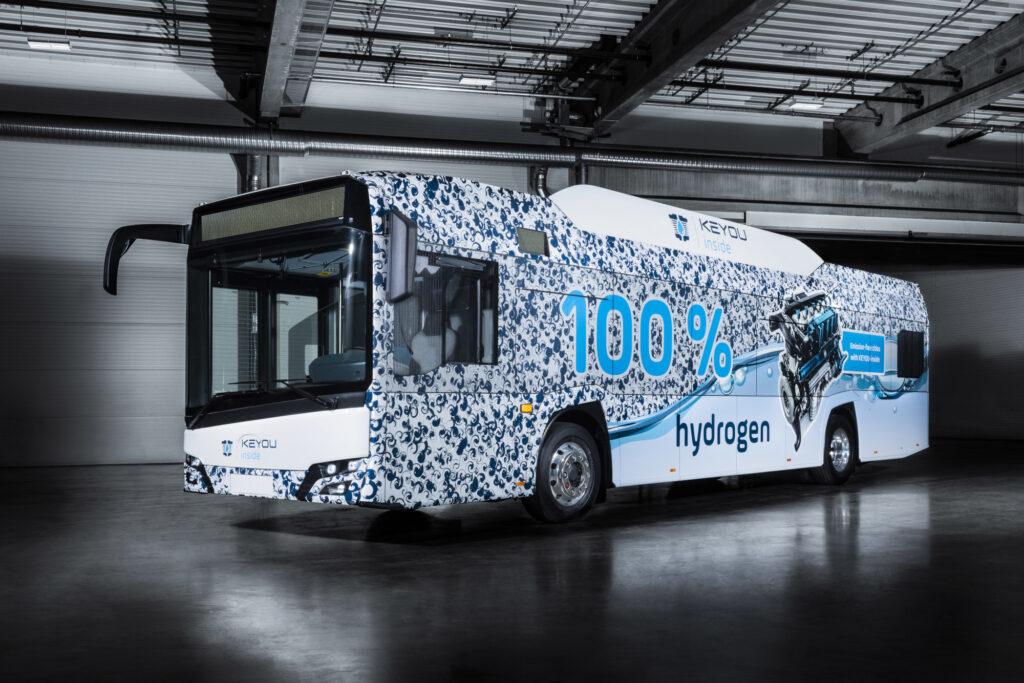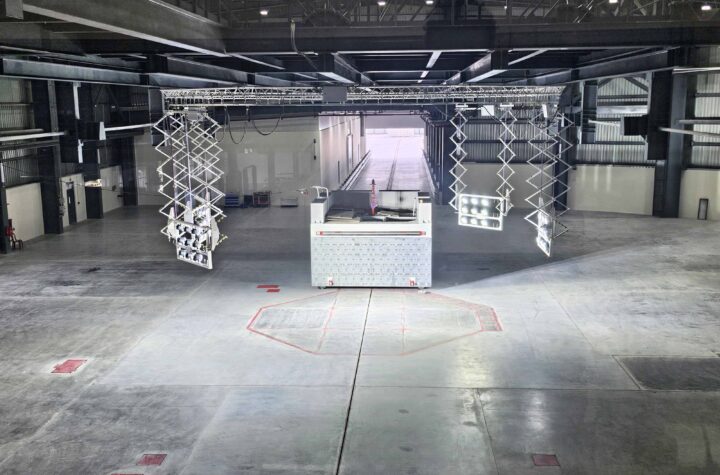
Hydrogen is one of the energy sources that will play a vital role in decarbonizing our world. Due to the high energy density of hydrogen, it will also play a key role in transforming the global mobility market. KEYOU, a clean mobility company leading in hydrogen technologies and Voith recently set up a first prototype for a hydrogen-driven city bus, which will be presented during IAA Transportation 2022 in hall 12, stand F60.
The 12-meter vehicle, which is based on the chassis of a leading European bus manufacturer, is equipped with a unique combination of “KEYOU-inside hydrogen engine” and Voith DIWA NXT mild-hybrid system. Development and construction of the vehicle are supported by the Bavarian Ministry of Economic Affairs.
With this step, Voith took a further important step towards its target to play a key role in the global decarbonization of public transport.
Strong partnership for emission-free mobility Since 2015, KEYOU has been developing H2-specific technologies, components, and combustion processes that can be used to transform conventional combustion engines into emission-free hydrogen engines. The new “green” combustion engine with KEYOU-inside technology means zero emissions, efficiency, and economy at the same time – without compromising on performance, capacity, or range. Vehicles with such engines are considered zero-emission vehicles according to EU standards.
The DIWA NXT automatic transmission for buses is designed as a mild-hybrid system. The central recuperation unit (CRU) recovers electrical energy generated from the driving operation. It delivers peak power up to 35kW at 48V. In this very special concept, Voith changed the main functionality of the CRU to mainly support the start-up procedure of the bus. The combination of hydrogen combustion engine and mild-hybrid system thus creates a new zero-emission mobility that can rely on existing infrastructure. The CRU is integrated into the flywheel housing between the engine and transmission and requires almost no additional installation space.
About KEYOU
KEYOU is a successful clean mobility company based in Munich which developed innovative hydrogen technologies since 2015. With its technology approach, KEYOU is transforming conventional diesel engines into emission-free hydrogen engines – cost-efficiently and without extensive modifications to the base engine. With the engine conversion and integration of a hydrogen tank system, KEYOU offers its customers emission-free, efficient, and economical hydrogen vehicles – without compromising performance, capacity, and range.
In addition to conversion and a CO2-free “second life” for existing vehicles, KEYOU’s “Hydrogen Mobility as a Service” approach is a fully comprehensive hydrogen mobility solution. The package ranges from the vehicle and engine conversion over fuel and infrastructure to insurance, service, and maintenance. With KEYOU, zero-emission mobility becomes a reality.
About the Voith Group
The Voith Group is a global technology company. With its broad portfolio of systems, products, services and digital applications, Voith sets standards in the markets of energy, paper, raw materials and transport & automotive. Founded in 1867, the company today has around 20,000 employees, sales of € 4.3 billion and locations in over 60 countries worldwide and is thus one of the larger family-owned companies in Europe.
The Group Division Voith Turbo is part of the Voith Group and a specialist for intelligent drive technology, systems as well as tailor-made services. With its innovative and smart products, Voith offers highest efficiency and reliability. Customers from highly diverse industries such as oil and gas, energy, mining and mechanical engineering, ship technology, rail and commercial vehicles rely on the advanced technologies and digital applications of Voith.









More Stories
MESSRING completes new crash test facility for Mahindra in India
ROHM Develops an Ultra-Compact MOSFET Featuring Industry-Leading* Low ON-Resistance Ideal for Fast Charging Applications
More than 30 of the top 50 global suppliers have production facilities in Turkey